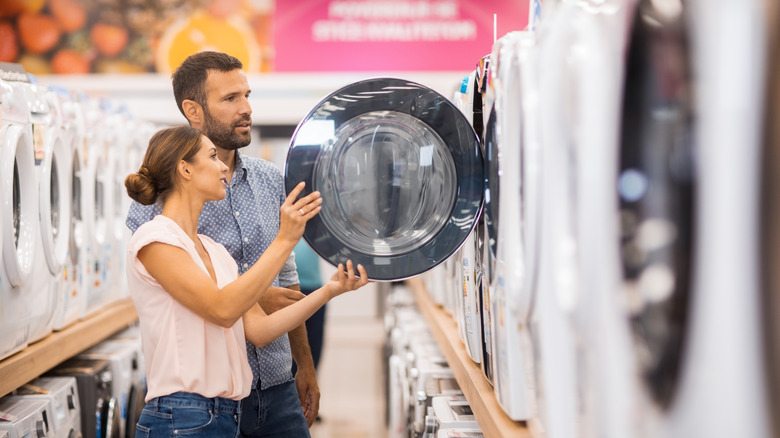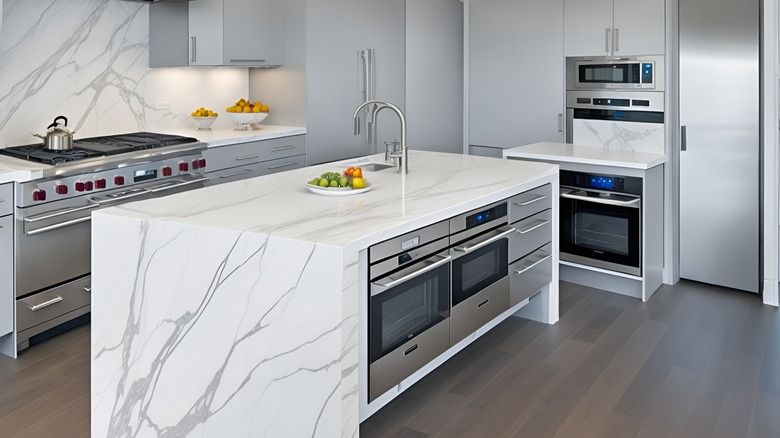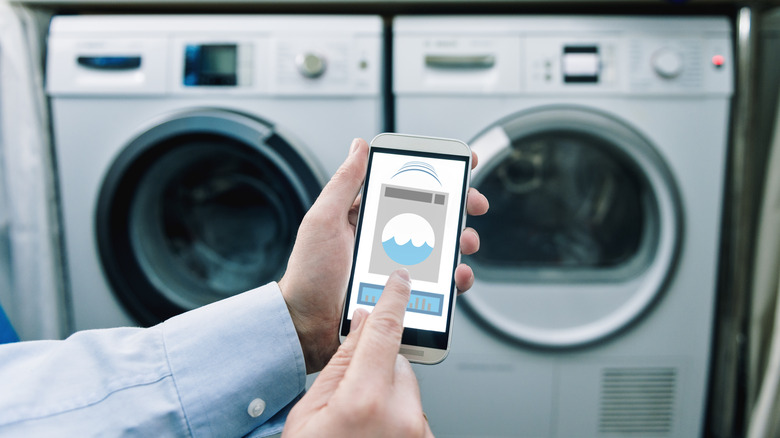Popular Appliance Splurges That May Not Be The Best Use Of Funds
Whether your washing machine is on its last leg or you're buying kitchen appliances for a renovation, you may feel overwhelmed with the amount of appliance choices on the market. There are countless brands and models out there, and just as many price tags. Some designer brands and smart appliances claim to have superior quality and features — but are they worth the extra cost? Ultimately, only you can decide. An appliance's value depends not only on the product itself, but on how you'll use it and your budget. There are many factors to consider beyond price, like appearance, convenience, lifespan, and cost of repairs. Some of these factors may be more or less important to you.
However, you may find that luxury and smart appliances aren't the best use of funds. In an interview with Realtor.com, home renovator Isabella Flint described high-end appliances as "the biggest waste of money when designing your kitchen." Her recommendation? "[D]o research on the best appliances for your budget. Then look carefully at the customer reviews. They'll often be just as good as the big brands." As Flint says, it may be better to search for appliances that specifically cater to your needs instead of the best and most fancy types on the market, as this will undoubtedly save you money.
Designer brands
High-end or designer appliance brands like Miele, Wolf, Viking, Thermador, and Gaggenau put more emphasis on appearance than lower-tier options. You're not just paying for the product, you're also paying for a chic, luxurious look and a well-known brand name — leading you to possibly waste money. Designer appliances are also built with higher-quality materials and, in theory, should last longer and perform better than cheaper models. But do they really?
For example, one JennAir fridge will set you back nearly $10,000 at AjMadison. Many buyers love the sleek, modern look and the unique black interior — but some complain that there's no water dispenser on the outside and the inside isn't as spacious as it appears. Some even had problems with the fridge not getting cold enough or the door not closing properly. A comparably-sized LG fridge, which costs only $2,095 at Home Depot, offers a water dispenser and about 8 extra cubic feet of interior space for a fraction of the price.
Depending on how you'll use it and what features you need, it may be worth paying a little more for the right appliance. But paying thousands of dollars more for appearance over functionality probably isn't the best investment. Always do your research and look through online reviews to see what real customers think. With most designer appliances, you can find a mid-tier model that performs just as well, if not better.
Smart appliances
Today's market is inundated with smart appliances — which, at the most basic level, can connect to the internet and be controlled remotely. But these high-tech gizmos offer so much more, from fridges that let you see what's inside while you're at the grocery to washers that automatically order more detergent when you run low. These smart features come with a higher price tag, so you'll have to determine whether they make sense for your needs. For instance, if you often forget about your laundry because your washer and dryer are in the garage, smart appliances that ping your phone when a load is done may be a worthwhile investment.
However, the electronics that make smart appliances so convenient can also create new headaches. Smart appliances rely on internet, so if your Wifi goes out, you may not be able to use some functions. For example, users have complained about a $3,600 GE oven that requires an internet connection to use the "convection roast" mode, even though convection was invented long before the internet existed (per Consumer Reports).
Because smart appliances rely on so many electronics, they require more specialized technicians and cost more to repair as well. And because they're constantly collecting data — sometimes including personal info like your birthday and phone number, which some manufacturers sell to third parties — they've raised concerns about privacy. It's important to consider the benefits and downsides of luxury and smart appliances to decide if these appliances are worth the splurge.


